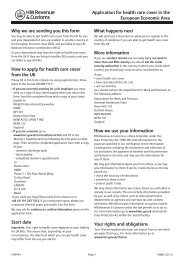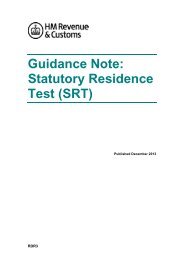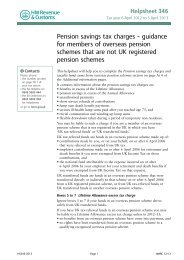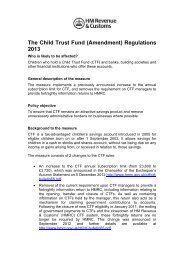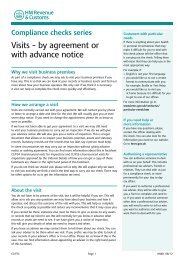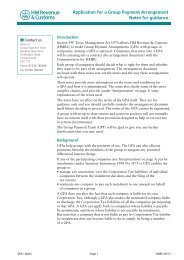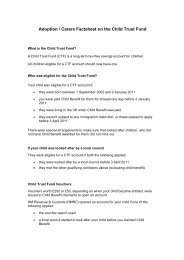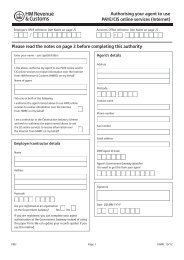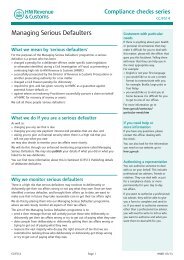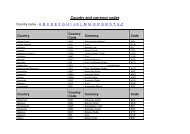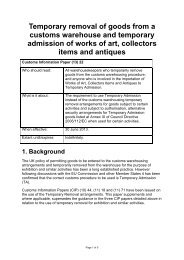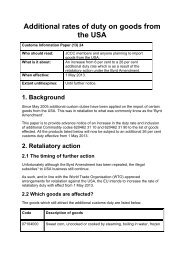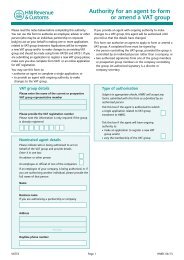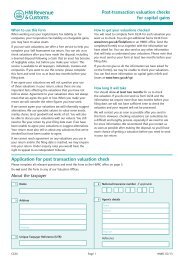IHT400 Notes : Guide to completing your Inheritance Tax account
IHT400 Notes : Guide to completing your Inheritance Tax account
IHT400 Notes : Guide to completing your Inheritance Tax account
Create successful ePaper yourself
Turn your PDF publications into a flip-book with our unique Google optimized e-Paper software.
<strong>IHT400</strong> <strong>Notes</strong><br />
Gifts with reservation<br />
of benefit<br />
5<br />
6<br />
<strong>Guide</strong> <strong>to</strong> <strong>completing</strong> <strong>your</strong> <strong>Inheritance</strong> <strong>Tax</strong> <strong>account</strong><br />
The deceased ceased <strong>to</strong> have a right <strong>to</strong> benefit from assets<br />
The deceased may have been entitled <strong>to</strong> benefit from the assets held in a<br />
trust or settlement, but during their lifetime that entitlement came <strong>to</strong> an<br />
end. This may be in whole or in part.<br />
Their entitlement <strong>to</strong> benefit from the asset may have come <strong>to</strong> an end<br />
because of the terms of a trust or because the deceased asked the trustees<br />
<strong>to</strong> alter or terminate their entitlement.<br />
Gifts treated as exempt because they are gifts out of income<br />
If you are claiming that gifts made by the deceased are exempt as gifts<br />
made as part of normal expenditure out of income, please fill in the table<br />
on page 6 of the schedule, as well as giving details of the gifts on page 2 of<br />
the schedule.<br />
More information about the 'Normal Expenditure Out of Income' Exemption<br />
can be found at page 72 of this guide.<br />
A gift with reservation is one where the recipient does not fully own it or<br />
where the donor either reserves or takes some benefit from it.<br />
Where this happens the law says that we can include the assets as part of<br />
the deceased’s estate at death. This rule only applies <strong>to</strong> gifts made on or<br />
after 18 March 1986 and there is no seven year limit as there is for<br />
outright gifts.<br />
The most common examples of gifts with reservation include:<br />
• a parent (now deceased) gave their house <strong>to</strong> their son, but continued <strong>to</strong><br />
live there without paying rent.<br />
• a parent put a building society <strong>account</strong> in<strong>to</strong> their daughter's name but<br />
the interest the money earned continued <strong>to</strong> be paid <strong>to</strong> the parent.<br />
If the parent in the first example made an arrangement <strong>to</strong> pay rent at the<br />
market rate, then the parent (the donor) would not have reserved benefit.<br />
Details about the gift should be entered on page 2 of Schedule IHT403,<br />
'Gifts made within the seven years before death', instead.<br />
There may be times when a gift is originally given with reservation of<br />
benefit and the reservation ceases at a later date. For example, a parent<br />
gives their house <strong>to</strong> their son and continues <strong>to</strong> live there without paying<br />
rent. Two years later the parent starts <strong>to</strong> pay rent at the market rate. This<br />
means that the reservation has ceased.<br />
Once the reservation has ceased, the gift becomes an outright gift.<br />
We will consider the gift <strong>to</strong> have been made on the date the reservation<br />
ceased. In this example this will be on the first date the rent (at market<br />
rate) is paid.<br />
When we calculate the tax due, the seven year period would begin on the<br />
date the reservation ceased.<br />
If the deceased died within the seven year period, do not enter details<br />
here. Give details on page 2, 'Gifts made within the seven years before<br />
death', instead and include the value of the property at the time the<br />
reservation ceased.<br />
21



